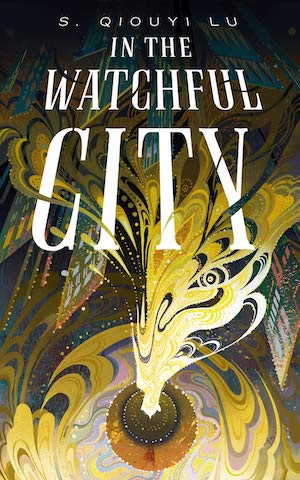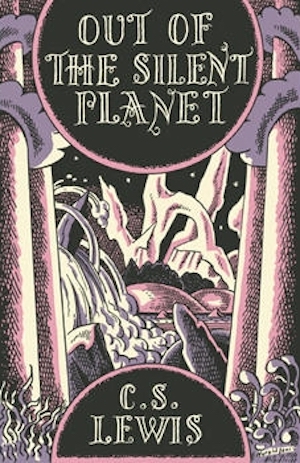When we started this series nearly two years ago, we started with the story of two friends, Jack and Tollers, walking through the woods and deciding together that if they wanted books they would enjoy—speculative fiction, essentially, but with a worldview more in line with their own—they would have to write those books themselves. They flipped a coin to see who would write about space travel, and who would write about time travel, and it was Jack who got “space.”
That’s the origin story of what would become C.S. Lewis’ Space Trilogy and also a little clue as to why the main character, Dr. Elwin Ransom—a professor and philologist with a fondness for long walks—resembles J.R.R. Tolkien so much.
The first book in the trilogy, Out of the Silent Planet, has enormous similarities with a book that Lewis and Tolkien were discussing on their walk together: H.G. Wells’ The First Men in the Moon. In Wells’ novel, like Lewis’, there is a scientist and a businessman who team up to build a spaceship in the English countryside, jaunt off into space, and find themselves in conversation with the alien leader of a planet (or satellite) where they have landed that is rich in gold, and in which they reveal the warlike nature of their people.
There are plenty of differences, too, but the one I find most hilarious is this: Wells’ work often has strong anti-religious elements to it. Lewis’ Space Trilogy has some strong anti-Wellsian elements.
Buy the Book


In the Watchful City
When Out of the Silent Planet hit bookshelves there was some argument amongst reviewers on how even to categorize this book. Critics disagreed for decades. Some said it was straight satire aimed at Wells. Some claimed it was poetry disguised in novel form. Is it a book about Christianity, or are the religious bits implicit? Or maybe it’s about Lewis’ Neo-Platonism. Maybe it’s straight science fiction or more of a religious fantasy or possibly an adventure “romance” and isn’t intended to be taken as much more than that (Lewis’ letters would argue otherwise on that one, though), or maybe the story is all window dressing to the philosophical underpinnings. My preferred reading—and not an uncommon one—is that it’s meant as a sort of persuasive fiction. It’s storytelling designed to alter our beliefs, to open our minds to a certain way of thinking.
Things to be looking for as you read the book:
- It’s pretty fun to read this book—published in the late 1930s—and look at the conception of what space flight might be like. It’s a little weird looking back now that we know how certain things work, and then see what Lewis got right and what he got wrong in his own portrayal of humans in spaceflight.
- Note the philosophy of language as something that shapes minds and makes certain cultural beliefs or insights possible or impossible.
- While Lewis believed in evolution as a scientific theory explaining life’s origins, he was not a fan at all of evolution as a social philosophy (i.e. “evolutionism”). You’ll note some straightforward critiques, especially of the Wellsian presentation of evolutionism. We’ll likely explore some of this in a longer article about Lewis and the singularity (spoiler, he’s not a fan).
- Likewise, keep an eye out for the not-at-all-disguised critiques of consumer-oriented capitalism.
- Critiques and responses to science fiction (especially Wells and Burroughs, as well as—though not “science fiction”—Kipling) as it relates to a primarily colonialist science fiction vision (i.e. “Earthmen come to this planet and make it ours”).
- Watch closely how the three “races” of Malacandra interact with one another, and how Lewis embraces, critiques, and refutes the idea of “primitive natives” on this planet.
- References to and critiques of modern (in Lewis’ time) race theory, especially as it relates to colonialism (i.e. “White man’s burden” which he mentions explicitly).
- Before we get too wrapped up in racialized readings of the three races of Malacandra, be sure to read up on Plato’s philosophy of the tri-part soul!
- Allusions to Wells, Kipling, the Bible, Alexander Pope, G.B. Shaw, William Morris, Aristotle, Plato, Chaucer, and probably more that I missed.
- There are a number of references in the worldbuilding to two philosophical and religious constructs Lewis is very fond of: Christianity and Neo-Platonism (particularly ideas related to pre-Christian utopian thought).
- Note also the discussions of what it means to be a person/sentient/hnau.
- Related: the idea of being “bent” is a core one when talking about human beings or Thulcandra (Earth). Be paying attention to how other hnau feel and think about this. Why are humans so scared? Why must Thulcandra be cut off from the rest of the solar system? How does it change our conception of life and death?
- It’s no mistake that Lewis spends such a long time trying to translate Weston’s speech from English into the Malacandran language. Be sure to read that section closely.
We’re well into the back half of the Great C.S. Lewis Reread now, and I’m looking forward to discussing each book of the Space Trilogy. Perelandra—the second book in the series—was one of my favorite Lewis books when I first read it years ago, and That Hideous Strength—the third—my least favorite. I’m curious to see if that changes at all now that I’m older. And don’t worry! I know there are strong opinions in our Tor.com community about all three of these books, and that there are people who would rank them in the opposite order of mine. As always, the conversations in the comments of these articles are at least half the fun, and I always learn something from your insights questions, and disagreements.
See you here in two weeks for our first exploration of Out of The Silent Planet! Be sure to take notes if there are specific things you want to make sure we discuss before we move on to Perelandra!
 Matt Mikalatos is the author of the YA fantasy The Crescent Stone. You can follow him on Twitter or connect on Facebook.
Matt Mikalatos is the author of the YA fantasy The Crescent Stone. You can follow him on Twitter or connect on Facebook.










